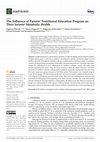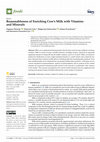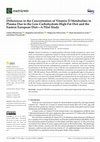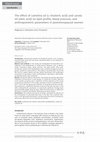Papers by Małgorzata Dobrzyńska

Archives of Medical Science, Mar 31, 2020
Introduction: Cold-pressed camelina oil (Camelina sativa) is rich in polyunsaturated fatty acids ... more Introduction: Cold-pressed camelina oil (Camelina sativa) is rich in polyunsaturated fatty acids and may have a beneficial effect on the reduction of cardiovascular risk. Material and methods: In this study, we investigated the parameters contributing to the development of cardiovascular diseases, such as dietary intake, nutritional status, blood pressure, and lipid profile. Sixty postmenopausal women with dyslipidaemia were randomly assigned to two oil groups: camelina oil and canola oil. The subjects consumed daily 30 g of the test oils for 6 weeks. Before and after dietary intervention, the assessment of nutrition (4-day dietary recall), anthropometric parameters, lipid profile, and blood pressure were evaluated. Results: During the dietary intervention, decreased low-density lipoprotein cholesterol concentration in both groups (15 mg/dl (0.4 mmol/l) reduction in the camelina oil group and 11 mg/dl (0.3 mmol/l) reduction in the canola oil group) was observed. In this study a decrease of waist circumference (approx. 1 cm) in the two groups was observed. In the group of women consuming camelina oil, a significant decrease of waist-to-hip ratio was seen. In the other anthropometric parameters no statistically significant changes were observed (body weight, body fat mass). After the intervention, no significant decreases in systolic and diastolic blood pressure were noticed. Conclusions: The camelina and canola oil intake contributed to reduction of the consumption of saturated fatty acids in the diet, had a positive influence on the lipid profile parameters, and decreased the waist circumference, which may reduce the risk of cardiovascular disease.

Nutrients
Recently, the prevalence of atopic dermatitis has increased drastically, especially in urban popu... more Recently, the prevalence of atopic dermatitis has increased drastically, especially in urban populations. This multifactorial skin disease is caused by complex interactions between various factors including genetics, environment, lifestyle, and diet. In eczema, apart from using an elimination diet, the adequate content of fatty acids from foods (saturated, monounsaturated, and polyunsaturated fatty acids) plays an important role as an immunomodulatory agent. Different aspects regarding atopic dermatitis include connections between lipid metabolism in atopic dermatitis, with the importance of the MUFA levels, as well as of the omega-6/omega-3 balance that affects the formation of long-chain (C20 eicosanoic and C22 docosaenoic) fatty acids and bioactive lipids from them (such as prostaglandins). Impair/repair of the functioning of epidermal barrier is influenced by these fatty acid levels. The purpose of this review is to drive attention to membrane fatty acid composition and its invo...
Foods
Cancer is one of the leading causes of death worldwide, the incidence of which is increasing annu... more Cancer is one of the leading causes of death worldwide, the incidence of which is increasing annually. Interest has recently grown in the anti-cancer effect of functional foods rich in selenium (Se). Although clinical studies are inconclusive and anti-cancer mechanisms of Se are not fully understood, daily doses of 100–200 µg of Se may inhibit genetic damage and the development of cancer in humans. The anti-cancer effects of this trace element are associated with high doses of Se supplements. The beneficial anti-cancer properties of Se and the difficulty in meeting the daily requirements for this micronutrient in some populations make it worth considering the use of functional foods enriched in Se. This review evaluated studies on the anti-cancer activity of the most used functional products rich in Se on the European market.
Fermentation
Milk and dairy products are among the most important foods in the human diet. They are natural an... more Milk and dairy products are among the most important foods in the human diet. They are natural and culturally accepted and supply the human body with microorganisms that modulate the intestinal microflora. Improper lifestyles, highly processed diets, and certain drugs may contribute to adverse changes in the composition of the gut microflora. These changes may lead to dysbiosis, which is associated with the pathogenesis of many gastrointestinal diseases. This review aims to determine the effect of fermented milk products on the composition of the gut microbiota and their possible support in the treatment of dysbiosis and gastrointestinal diseases. While most research concerns isolated strains of bacteria and their effects on the human body, our research focuses on whole fermented products that contain complex mixtures of bacterial strains.
Nutrients
Alzheimer’s disease is a progressive brain disease that is becoming a major health problem in tod... more Alzheimer’s disease is a progressive brain disease that is becoming a major health problem in today’s world due to the aging population. Despite it being widely known that diet has a significant impact on the prevention and progression of Alzheimer’s disease, the literature data are still scarce and controversial. The application of the principles of rational nutrition for the elderly is suggested for Alzheimer’s disease. The diet should be rich in neuroprotective nutrients, i.e., antioxidants, B vitamins, and polyunsaturated fatty acids. Some studies suggest that diets such as the Mediterranean diet, the DASH (Dietary Approaches to Stop Hypertension) diet, and the MIND (Mediterranean-DASH Intervention for Neurodegenerative Delay) diet have a beneficial effect on the risk of developing Alzheimer’s disease.
Journal of Health Inequalities

Nutrients
Childhood obesity is considered an epidemic in both developing and developed countries. Children ... more Childhood obesity is considered an epidemic in both developing and developed countries. Children obesity plays a vital role in children’s development and has a profound impact on their health in adult life. Although the etiology of obesity is multifactorial, it can be prevented. According to research, feeding practices, developing eating habits, and parenting styles are of primary importance. Despite the widespread access to information on children’s nutrition, parents still make many mistakes preparing their meals. Thus, this study aimed to evaluate the impact of parents’ nutritional education on children’s selected anthropometric-metabolic parameters during their first year of life. The study comprised a group of parents of 203 Polish infants. Their parents were randomly assigned to one of two groups: the intervention group received intensive mobile nutritional education for a year, while the control group received no intervention. Blood tests and anthropometric measures were perf...
Acta Poloniae Pharmaceutica - Drug Research

Nutrients
Iron is an essential nutrient for a child’s proper development at every growth stage. It is cruci... more Iron is an essential nutrient for a child’s proper development at every growth stage. It is crucial for the production of red blood and muscle cells, DNA replication, and the development of the brain, nervous and immune systems. Iron deficiency is the most common micronutrient deficiency in children worldwide. Despite widespread access to nutritional information for children, parents continue to make many feeding mistakes. This study aimed to assess whether any nutritional intervention would affect the iron status in children. The parents of 203 children were randomly assigned to one of two groups: the study group received intensive mobile nutritional education for a year, while the control group received no intervention. Blood tests were performed on both groups at the beginning of the study and one year later. The educational intervention resulted in statistically significantly higher levels of RBC (red blood cells; p = 0.020), HGB (haemoglobin; p = 0.039), HCT (haematocrit; p = 0...

Foods
Milk is an exceptional nutritional product that has been used for many millennia in human nutriti... more Milk is an exceptional nutritional product that has been used for many millennia in human nutrition. Milk is a source of many valuable nutrients, including calcium, vitamin B, an especially significant amount of vitamin B2 and fat-soluble vitamins, such as A, D and E. Milk is an attractive product for fortification as it has a high nutritional density in a small volume and a relatively low price. Research shows positive health effects of drinking milk and consuming dairy products. Even more health benefits can be obtained from consuming fortified dairy products. A literature review, current nutritional recommendations, medical recommendations and an analysis of the market situation all recommend introducing milk enriched with minerals in combination with vitamins to the market. This concept corresponds to the current market demand and may supplement the missing and expected range of fortified milk and the correct number of recipients.
Acta Poloniae Pharmaceutica - Drug Research, 2021

Nutrients, 2021
Vitamin D deficiency is a global problem with many health consequences, and it is currently recom... more Vitamin D deficiency is a global problem with many health consequences, and it is currently recommended to supplement vitamin D. Change of diet should also be considered to ensure adequate vitamin D in the human body. The aim of this study was to assess the concentration of vitamin D metabolites in two different groups: one group on the low-carbohydrate-high-fat (LCHF) diet and the other group on the Eastern European (EE) diet. In the first stage, 817 participants declaring traditional EE diet or LCHF diet were investigated. Nutrition (self-reported 3-day estimated food record) and basic anthropometric parameters were assessed. After extra screening, 67 participants on the EE diet and 41 on the LCHF diet were qualified for the second stage. Plasma 25-hydroxycholecalciferol (25(OH)D3) and (25(OH)D2) concentration was measured by the validated HPLC—MS/MS method. Plasma 25(OH)D3 concentration was significantly higher in the group on the LCHF diet (34.9 ± 15.9 ng/mL) than in the group o...

Archives of Medical Science : AMS, 2020
Introduction Cold-pressed camelina oil (Camelina sativa) is rich in polyunsaturated fatty acids a... more Introduction Cold-pressed camelina oil (Camelina sativa) is rich in polyunsaturated fatty acids and may have a beneficial effect on the reduction of cardiovascular risk. Material and methods In this study, we investigated the parameters contributing to the development of cardiovascular diseases, such as dietary intake, nutritional status, blood pressure, and lipid profile. Sixty postmenopausal women with dyslipidaemia were randomly assigned to two oil groups: camelina oil and canola oil. The subjects consumed daily 30 g of the test oils for 6 weeks. Before and after dietary intervention, the assessment of nutrition (4-day dietary recall), anthropometric parameters, lipid profile, and blood pressure were evaluated. Results During the dietary intervention, decreased low-density lipoprotein cholesterol concentration in both groups (15 mg/dl (0.4 mmol/l) reduction in the camelina oil group and 11 mg/dl (0.3 mmol/l) reduction in the canola oil group) was observed. In this study a decreas...

Journal of Medical Science, 2014
Introduction. Proper nutrition and the use of preemptive care can prevent the development of card... more Introduction. Proper nutrition and the use of preemptive care can prevent the development of cardiovascular diseases, which are the main cause of death in the world. Aim. The aims of this study were to evaluate the nutritional habits, nutritional status, assessment of knowledge and use of nutritional prevention among group of women and men aged 20 to 30 years, living in Wielkopolska in the aspect of CVD risk.Material and methods. In this study the method of 24-hour dietary recall to evaluate nutrition intake was used. To determine the nutritional status the anthropometric measurements (weight, height, waist) were taken, and BMI values were calculated. Assessment of knowledge and use of nutritional prevention in cardiovascular disease was performed by a questionnaire. The atherogenicity of the diets was evaluated using Keys score.Results. The analysis of daily food rations showed differences between dietary guidelines and respondent diets, mainly in protein, fat, saturated fat and ch...

Nutrients, 2021
The inappropriate concentration of copper (Cu) and zinc (Zn) in formulae for infants can lead to ... more The inappropriate concentration of copper (Cu) and zinc (Zn) in formulae for infants can lead to abnormal micronutrient intake and adverse health outcomes. This study aimed to determine the concentration of Cu and Zn in different formulae and evaluate the Cu/Zn ratio. Besides, the daily intake (DI) of both micronutrients was estimated. Cu and Zn concentration in 103 formulae for infants, available in the Polish market, were assessed using atomic absorption spectrometry. The estimated DI was calculated from the average energy requirements for the 0–6 months aged infants. The microelement content of formulae was mostly in good agreement with that declared by the manufacturer (5–10% variations compared to the labeled values). The Cu/Zn ratio ranged from 1:8 to 1:25. The estimated DI of Cu was in the range of 0.14–1.11 mg/day. Six (6.7%) of the formulae did not meet the recommended range of Cu intake, especially during the first month of life and in the case of formulae for special medi...

Biomolecules, 2020
Flavonoids, a ubiquitous group of naturally occurring polyphenolic compounds, have recently gaine... more Flavonoids, a ubiquitous group of naturally occurring polyphenolic compounds, have recently gained importance as anticancer agents. Unfortunately, due to low solubility, absorption, and rapid metabolism of dietary flavonoids, their anticancer potential is not sufficient. Nanocarriers can improve the bioavailability of flavonoids. In this review we aimed to evaluate studies on the anticancer activity of flavonoid nanoparticles. A review of English language articles published until 30 June 2020 was conducted, using PubMed (including MEDLINE), CINAHL Plus, Cochrane, and Web of Science data. Most studies determining the anticancer properties of flavonoid nanoparticles are preclinical. The potential anticancer activity focuses mainly on MCF-7 breast cancer cells, A549 lung cancer cells, HepG2 liver cancer cells, and melanoma cells. The flavonoid nanoparticles can also support the anti-tumour effect of drugs used in cancer therapy by enhancing the anti-tumour effect or reducing the system...

Journal of Medical Science, 2019
Aim. The aim of this study was to assess eating behavior in the groups of women who are working o... more Aim. The aim of this study was to assess eating behavior in the groups of women who are working on different, unchanged shifts as well as identifying differences in the consumption of nutrients that may increase the risk of cardiovascular disease.Material and Methods. The study was carried out among 300 randomly selected women working in a permanent shift (morning, afternoon, night). In the study, the assessment of the daily intake was carried out using 24-h dietary recall. Anthropometric measurements were carried out to assess the nutritional status. The interview regarding the food consumption was complemented by dietary questionnaire about selected lifestyle parameters contributing to the development of cardiovascular disease and the type of their work.Results. The body mass index (BMI) in all groups was within the adequate values. The analysis of waist to hip ratio (WHR) showed that in the morning and night shift, was exceeded the adequate values recommended in the prevention of...

Polish Journal of Public Health, 2019
Introduction. A balanced diet can help to prevent cardiovascular diseases. It particularly applie... more Introduction. A balanced diet can help to prevent cardiovascular diseases. It particularly applies to the increased risk patients, including postmenopausal women with dyslipidaemia. Aim. The aim of this study was to assess dietary habits, and consumption of selected nutrients which may have influence on the cardiovascular risk and determine nutritional knowledge in the group of women. Material and methods. The study was conducted in 60 postmenopausal women with dyslipidaemia. The nutritional status was assessed on the basis of anthropometric measurements. The assessment of nutrition was evaluated using a 24-hour dietary recall during 4 days. Based on the authors’ questionnaire, dietary habits and the level of knowledge on the cardiovascular risk factors were assessed. Results. The diet of the studied group of women was characterized by excessive supply of energy derived from fat and inappropriate supply of cholesterol, dietary fiber, sodium and vitamin D. Based on the assessed dieta...
Nutrients
Selenium (Se), an essential trace element, is fundamental to human health, playing an important r... more Selenium (Se), an essential trace element, is fundamental to human health, playing an important role in the formation of thyroid hormones, DNA synthesis, the immune response, and fertility. There is a lack of comprehensive epidemiological research, particularly the serum Se concetration in healthy infants and preschool children compared to the estimated dietary Se intake. However, Se deficiencies and exceeding the UL have been observed in infants and preschool children. Despite the observed irregularities in Se intake, there is a lack of nutritional recommendations for infants and preschool children. Therefore, the main objective of this literature review was to summarize what is known to date about Se levels and the risk of deficiency related to regular consumption in infants and preschool children.











Uploads
Papers by Małgorzata Dobrzyńska